Total Quality Management for UAE Government Sector Improvement
VerifiedAdded on 2021/06/15
|15
|3960
|59
Report
AI Summary
This research paper evaluates the implementation of Total Quality Management (TQM) to improve productivity and organizational excellence within the government sectors of the United Arab Emirates (UAE), with a specific focus on Al Ain and Abu Dhabi. The study begins by introducing the concept of TQM and its relevance to both private and public sectors, highlighting its role in enhancing service quality and competitiveness. The paper explores the background of TQM, its aims, objectives, and key research questions, which guide the investigation into the various forms of quality management, their operational directions, and the strategies implemented by the government to benefit its citizens. A comprehensive literature review examines the application of TQM in different contexts, including its critical success factors (CSFs) and its impact on organizational performance, drawing on various studies and models like the Malcolm Baldrige Model. The research methodology outlines the theoretical framework and design, including data collection methods. The paper aims to identify how TQM can improve productivity and organizational excellence in the UAE's public sector, analyzing policies and strategies, and identifying CSFs. Overall, this research provides a detailed analysis of TQM's role in the UAE public sector and its potential for improving government services.
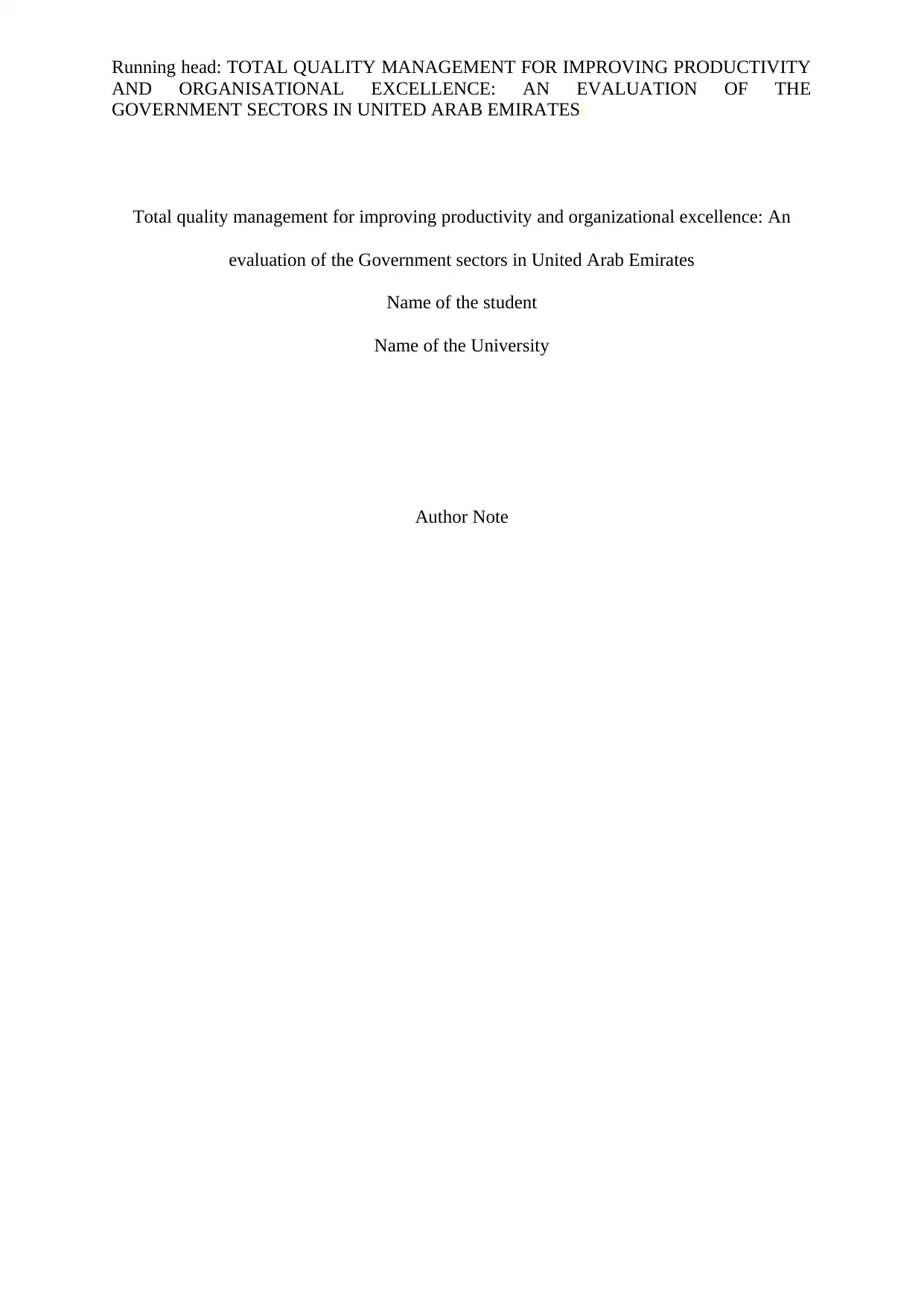
Running head: TOTAL QUALITY MANAGEMENT FOR IMPROVING PRODUCTIVITY
AND ORGANISATIONAL EXCELLENCE: AN EVALUATION OF THE
GOVERNMENT SECTORS IN UNITED ARAB EMIRATES
Total quality management for improving productivity and organizational excellence: An
evaluation of the Government sectors in United Arab Emirates
Name of the student
Name of the University
Author Note
AND ORGANISATIONAL EXCELLENCE: AN EVALUATION OF THE
GOVERNMENT SECTORS IN UNITED ARAB EMIRATES
Total quality management for improving productivity and organizational excellence: An
evaluation of the Government sectors in United Arab Emirates
Name of the student
Name of the University
Author Note
Paraphrase This Document
Need a fresh take? Get an instant paraphrase of this document with our AI Paraphraser
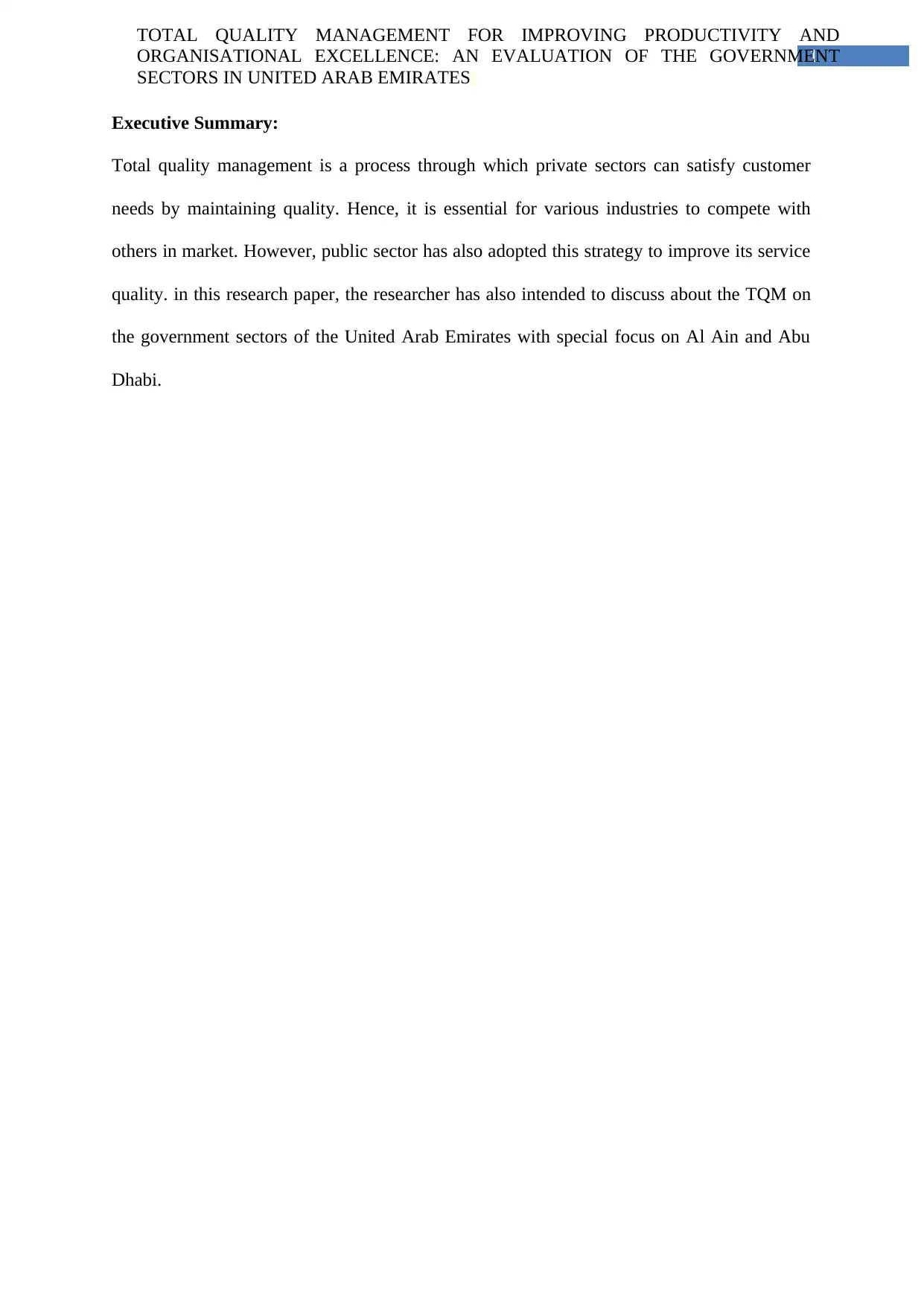
1
TOTAL QUALITY MANAGEMENT FOR IMPROVING PRODUCTIVITY AND
ORGANISATIONAL EXCELLENCE: AN EVALUATION OF THE GOVERNMENT
SECTORS IN UNITED ARAB EMIRATES
Executive Summary:
Total quality management is a process through which private sectors can satisfy customer
needs by maintaining quality. Hence, it is essential for various industries to compete with
others in market. However, public sector has also adopted this strategy to improve its service
quality. in this research paper, the researcher has also intended to discuss about the TQM on
the government sectors of the United Arab Emirates with special focus on Al Ain and Abu
Dhabi.
TOTAL QUALITY MANAGEMENT FOR IMPROVING PRODUCTIVITY AND
ORGANISATIONAL EXCELLENCE: AN EVALUATION OF THE GOVERNMENT
SECTORS IN UNITED ARAB EMIRATES
Executive Summary:
Total quality management is a process through which private sectors can satisfy customer
needs by maintaining quality. Hence, it is essential for various industries to compete with
others in market. However, public sector has also adopted this strategy to improve its service
quality. in this research paper, the researcher has also intended to discuss about the TQM on
the government sectors of the United Arab Emirates with special focus on Al Ain and Abu
Dhabi.
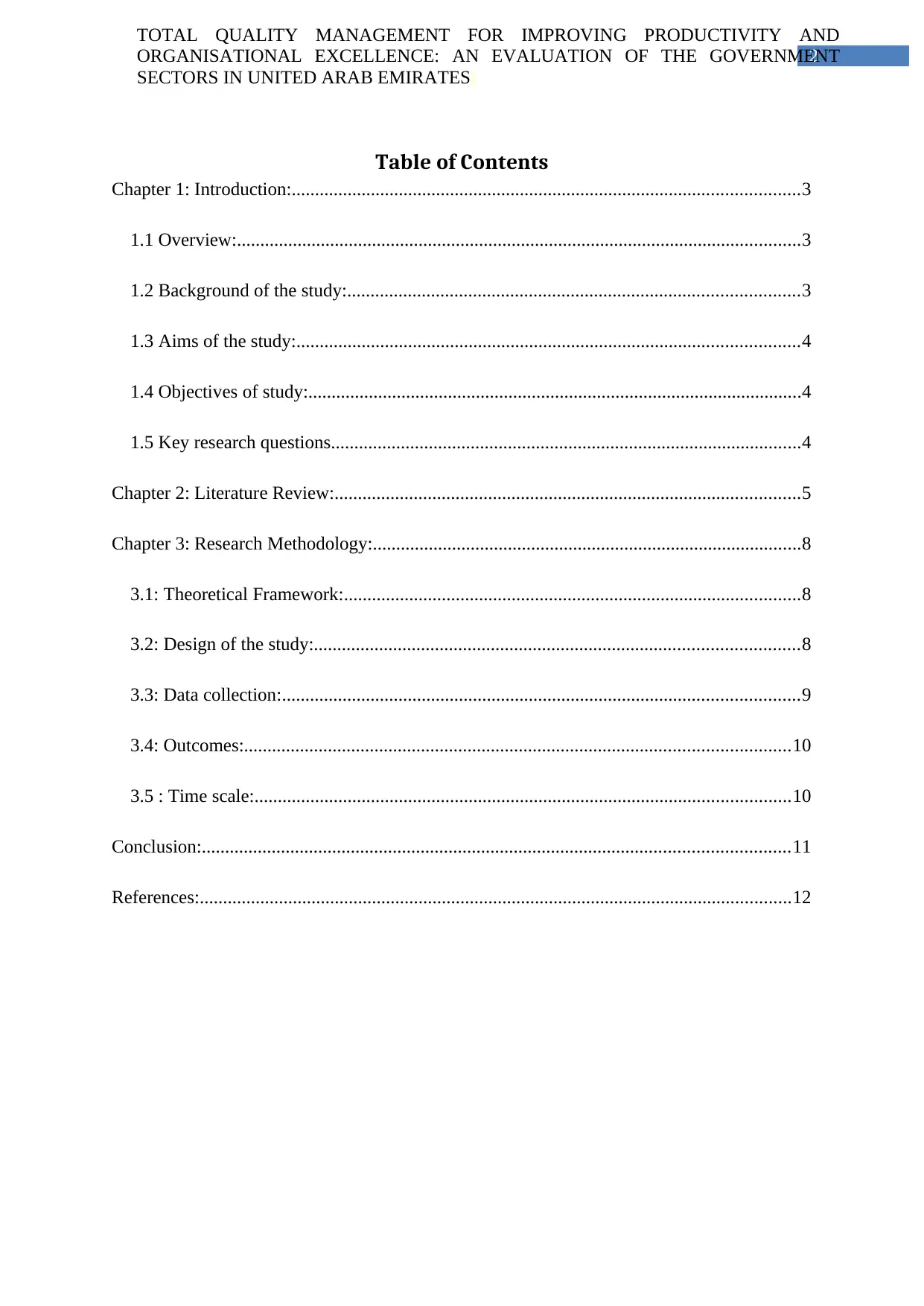
2
TOTAL QUALITY MANAGEMENT FOR IMPROVING PRODUCTIVITY AND
ORGANISATIONAL EXCELLENCE: AN EVALUATION OF THE GOVERNMENT
SECTORS IN UNITED ARAB EMIRATES
Table of Contents
Chapter 1: Introduction:.............................................................................................................3
1.1 Overview:.........................................................................................................................3
1.2 Background of the study:.................................................................................................3
1.3 Aims of the study:............................................................................................................4
1.4 Objectives of study:..........................................................................................................4
1.5 Key research questions.....................................................................................................4
Chapter 2: Literature Review:....................................................................................................5
Chapter 3: Research Methodology:............................................................................................8
3.1: Theoretical Framework:..................................................................................................8
3.2: Design of the study:........................................................................................................8
3.3: Data collection:...............................................................................................................9
3.4: Outcomes:.....................................................................................................................10
3.5 : Time scale:...................................................................................................................10
Conclusion:..............................................................................................................................11
References:...............................................................................................................................12
TOTAL QUALITY MANAGEMENT FOR IMPROVING PRODUCTIVITY AND
ORGANISATIONAL EXCELLENCE: AN EVALUATION OF THE GOVERNMENT
SECTORS IN UNITED ARAB EMIRATES
Table of Contents
Chapter 1: Introduction:.............................................................................................................3
1.1 Overview:.........................................................................................................................3
1.2 Background of the study:.................................................................................................3
1.3 Aims of the study:............................................................................................................4
1.4 Objectives of study:..........................................................................................................4
1.5 Key research questions.....................................................................................................4
Chapter 2: Literature Review:....................................................................................................5
Chapter 3: Research Methodology:............................................................................................8
3.1: Theoretical Framework:..................................................................................................8
3.2: Design of the study:........................................................................................................8
3.3: Data collection:...............................................................................................................9
3.4: Outcomes:.....................................................................................................................10
3.5 : Time scale:...................................................................................................................10
Conclusion:..............................................................................................................................11
References:...............................................................................................................................12
⊘ This is a preview!⊘
Do you want full access?
Subscribe today to unlock all pages.

Trusted by 1+ million students worldwide
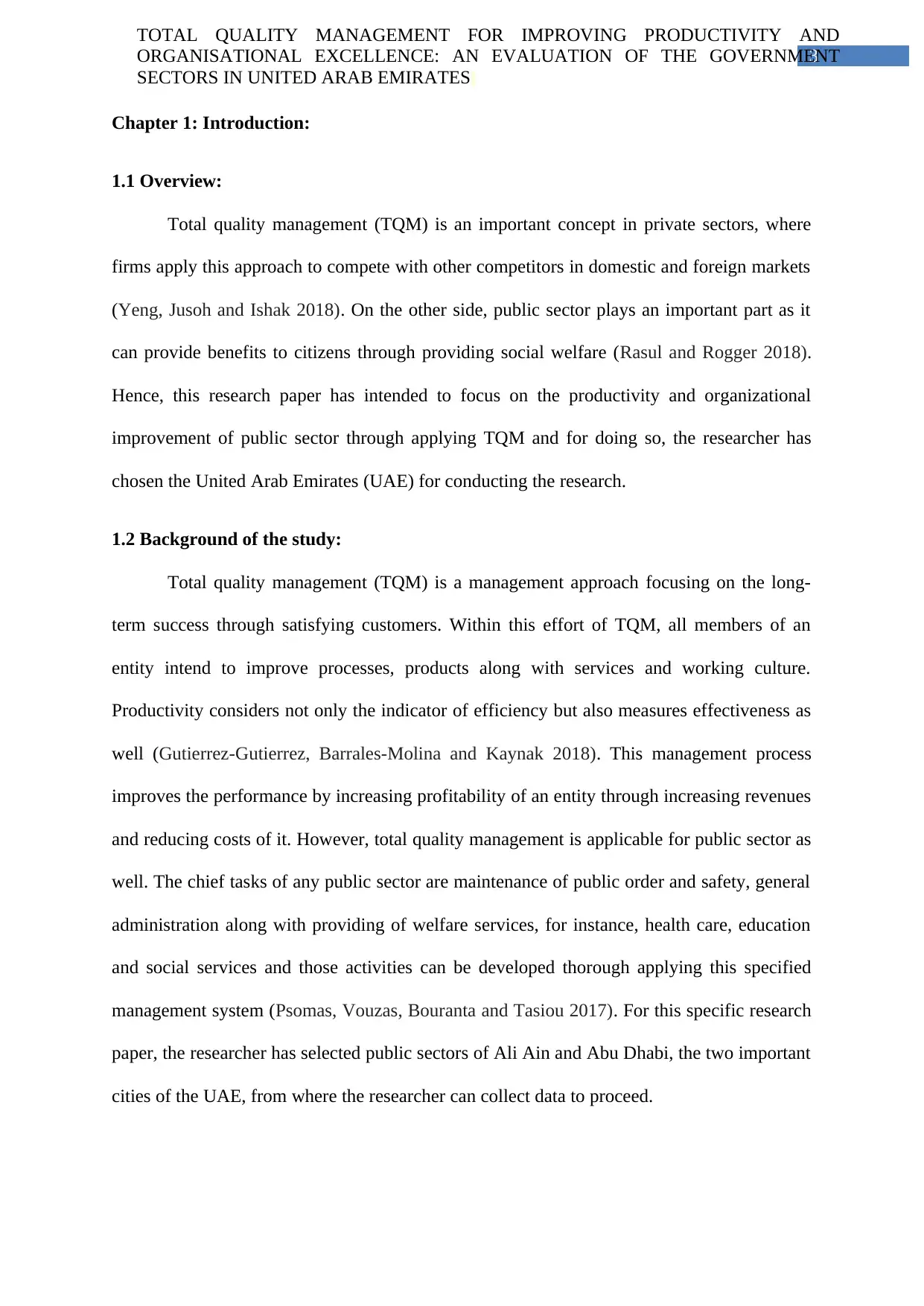
3
TOTAL QUALITY MANAGEMENT FOR IMPROVING PRODUCTIVITY AND
ORGANISATIONAL EXCELLENCE: AN EVALUATION OF THE GOVERNMENT
SECTORS IN UNITED ARAB EMIRATES
Chapter 1: Introduction:
1.1 Overview:
Total quality management (TQM) is an important concept in private sectors, where
firms apply this approach to compete with other competitors in domestic and foreign markets
(Yeng, Jusoh and Ishak 2018). On the other side, public sector plays an important part as it
can provide benefits to citizens through providing social welfare (Rasul and Rogger 2018).
Hence, this research paper has intended to focus on the productivity and organizational
improvement of public sector through applying TQM and for doing so, the researcher has
chosen the United Arab Emirates (UAE) for conducting the research.
1.2 Background of the study:
Total quality management (TQM) is a management approach focusing on the long-
term success through satisfying customers. Within this effort of TQM, all members of an
entity intend to improve processes, products along with services and working culture.
Productivity considers not only the indicator of efficiency but also measures effectiveness as
well (Gutierrez-Gutierrez, Barrales-Molina and Kaynak 2018). This management process
improves the performance by increasing profitability of an entity through increasing revenues
and reducing costs of it. However, total quality management is applicable for public sector as
well. The chief tasks of any public sector are maintenance of public order and safety, general
administration along with providing of welfare services, for instance, health care, education
and social services and those activities can be developed thorough applying this specified
management system (Psomas, Vouzas, Bouranta and Tasiou 2017). For this specific research
paper, the researcher has selected public sectors of Ali Ain and Abu Dhabi, the two important
cities of the UAE, from where the researcher can collect data to proceed.
TOTAL QUALITY MANAGEMENT FOR IMPROVING PRODUCTIVITY AND
ORGANISATIONAL EXCELLENCE: AN EVALUATION OF THE GOVERNMENT
SECTORS IN UNITED ARAB EMIRATES
Chapter 1: Introduction:
1.1 Overview:
Total quality management (TQM) is an important concept in private sectors, where
firms apply this approach to compete with other competitors in domestic and foreign markets
(Yeng, Jusoh and Ishak 2018). On the other side, public sector plays an important part as it
can provide benefits to citizens through providing social welfare (Rasul and Rogger 2018).
Hence, this research paper has intended to focus on the productivity and organizational
improvement of public sector through applying TQM and for doing so, the researcher has
chosen the United Arab Emirates (UAE) for conducting the research.
1.2 Background of the study:
Total quality management (TQM) is a management approach focusing on the long-
term success through satisfying customers. Within this effort of TQM, all members of an
entity intend to improve processes, products along with services and working culture.
Productivity considers not only the indicator of efficiency but also measures effectiveness as
well (Gutierrez-Gutierrez, Barrales-Molina and Kaynak 2018). This management process
improves the performance by increasing profitability of an entity through increasing revenues
and reducing costs of it. However, total quality management is applicable for public sector as
well. The chief tasks of any public sector are maintenance of public order and safety, general
administration along with providing of welfare services, for instance, health care, education
and social services and those activities can be developed thorough applying this specified
management system (Psomas, Vouzas, Bouranta and Tasiou 2017). For this specific research
paper, the researcher has selected public sectors of Ali Ain and Abu Dhabi, the two important
cities of the UAE, from where the researcher can collect data to proceed.
Paraphrase This Document
Need a fresh take? Get an instant paraphrase of this document with our AI Paraphraser
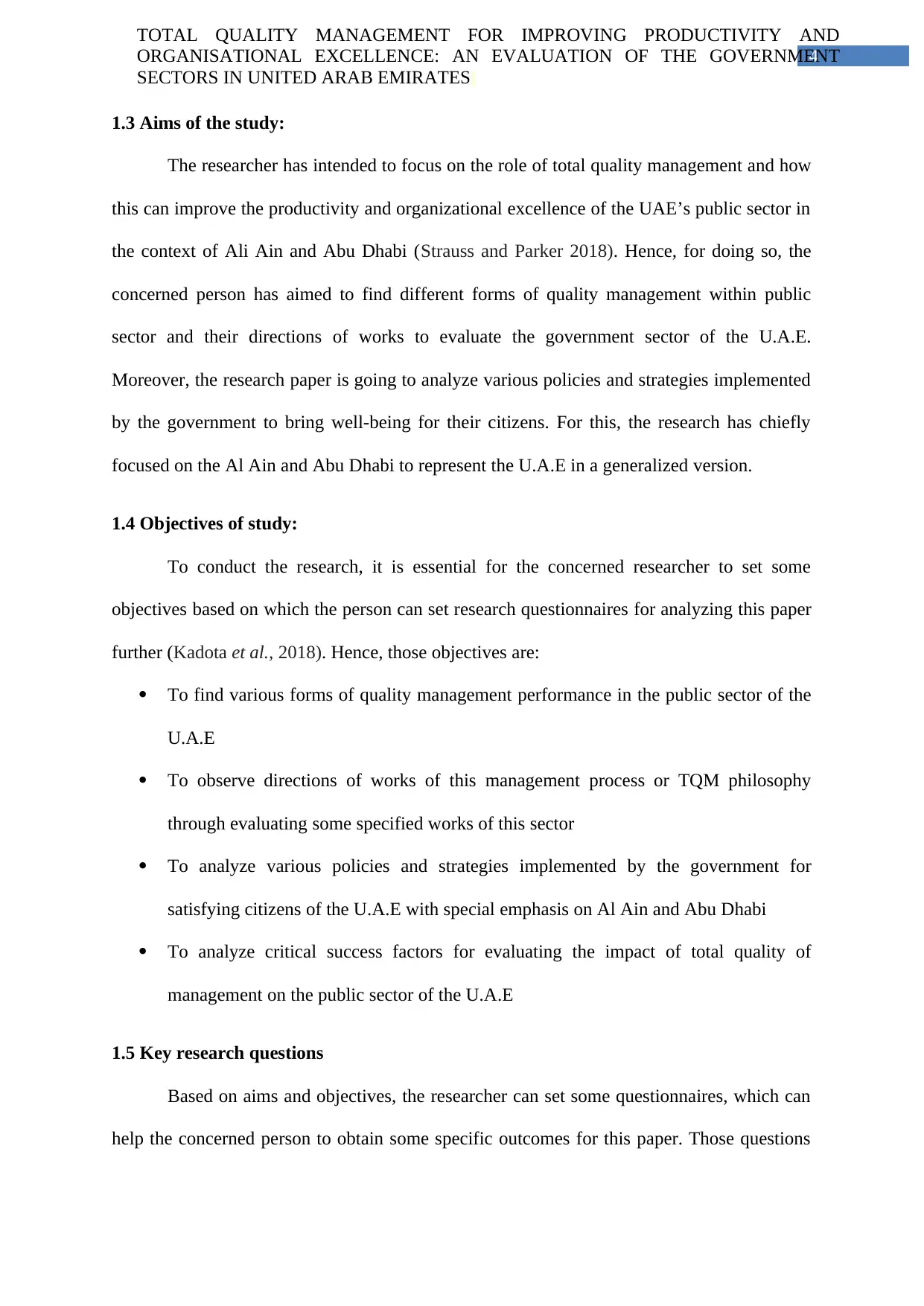
4
TOTAL QUALITY MANAGEMENT FOR IMPROVING PRODUCTIVITY AND
ORGANISATIONAL EXCELLENCE: AN EVALUATION OF THE GOVERNMENT
SECTORS IN UNITED ARAB EMIRATES
1.3 Aims of the study:
The researcher has intended to focus on the role of total quality management and how
this can improve the productivity and organizational excellence of the UAE’s public sector in
the context of Ali Ain and Abu Dhabi (Strauss and Parker 2018). Hence, for doing so, the
concerned person has aimed to find different forms of quality management within public
sector and their directions of works to evaluate the government sector of the U.A.E.
Moreover, the research paper is going to analyze various policies and strategies implemented
by the government to bring well-being for their citizens. For this, the research has chiefly
focused on the Al Ain and Abu Dhabi to represent the U.A.E in a generalized version.
1.4 Objectives of study:
To conduct the research, it is essential for the concerned researcher to set some
objectives based on which the person can set research questionnaires for analyzing this paper
further (Kadota et al., 2018). Hence, those objectives are:
To find various forms of quality management performance in the public sector of the
U.A.E
To observe directions of works of this management process or TQM philosophy
through evaluating some specified works of this sector
To analyze various policies and strategies implemented by the government for
satisfying citizens of the U.A.E with special emphasis on Al Ain and Abu Dhabi
To analyze critical success factors for evaluating the impact of total quality of
management on the public sector of the U.A.E
1.5 Key research questions
Based on aims and objectives, the researcher can set some questionnaires, which can
help the concerned person to obtain some specific outcomes for this paper. Those questions
TOTAL QUALITY MANAGEMENT FOR IMPROVING PRODUCTIVITY AND
ORGANISATIONAL EXCELLENCE: AN EVALUATION OF THE GOVERNMENT
SECTORS IN UNITED ARAB EMIRATES
1.3 Aims of the study:
The researcher has intended to focus on the role of total quality management and how
this can improve the productivity and organizational excellence of the UAE’s public sector in
the context of Ali Ain and Abu Dhabi (Strauss and Parker 2018). Hence, for doing so, the
concerned person has aimed to find different forms of quality management within public
sector and their directions of works to evaluate the government sector of the U.A.E.
Moreover, the research paper is going to analyze various policies and strategies implemented
by the government to bring well-being for their citizens. For this, the research has chiefly
focused on the Al Ain and Abu Dhabi to represent the U.A.E in a generalized version.
1.4 Objectives of study:
To conduct the research, it is essential for the concerned researcher to set some
objectives based on which the person can set research questionnaires for analyzing this paper
further (Kadota et al., 2018). Hence, those objectives are:
To find various forms of quality management performance in the public sector of the
U.A.E
To observe directions of works of this management process or TQM philosophy
through evaluating some specified works of this sector
To analyze various policies and strategies implemented by the government for
satisfying citizens of the U.A.E with special emphasis on Al Ain and Abu Dhabi
To analyze critical success factors for evaluating the impact of total quality of
management on the public sector of the U.A.E
1.5 Key research questions
Based on aims and objectives, the researcher can set some questionnaires, which can
help the concerned person to obtain some specific outcomes for this paper. Those questions
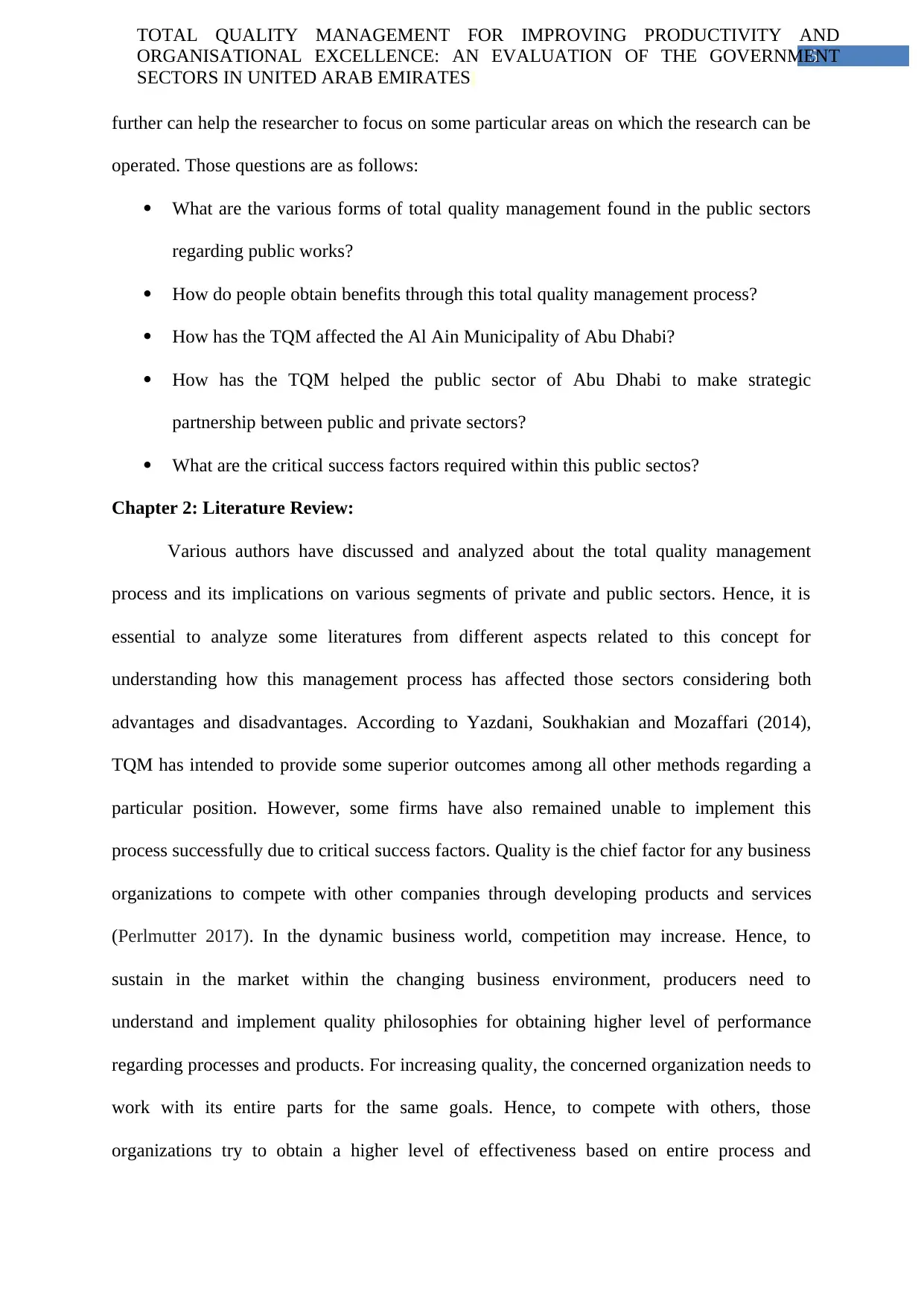
5
TOTAL QUALITY MANAGEMENT FOR IMPROVING PRODUCTIVITY AND
ORGANISATIONAL EXCELLENCE: AN EVALUATION OF THE GOVERNMENT
SECTORS IN UNITED ARAB EMIRATES
further can help the researcher to focus on some particular areas on which the research can be
operated. Those questions are as follows:
What are the various forms of total quality management found in the public sectors
regarding public works?
How do people obtain benefits through this total quality management process?
How has the TQM affected the Al Ain Municipality of Abu Dhabi?
How has the TQM helped the public sector of Abu Dhabi to make strategic
partnership between public and private sectors?
What are the critical success factors required within this public sectos?
Chapter 2: Literature Review:
Various authors have discussed and analyzed about the total quality management
process and its implications on various segments of private and public sectors. Hence, it is
essential to analyze some literatures from different aspects related to this concept for
understanding how this management process has affected those sectors considering both
advantages and disadvantages. According to Yazdani, Soukhakian and Mozaffari (2014),
TQM has intended to provide some superior outcomes among all other methods regarding a
particular position. However, some firms have also remained unable to implement this
process successfully due to critical success factors. Quality is the chief factor for any business
organizations to compete with other companies through developing products and services
(Perlmutter 2017). In the dynamic business world, competition may increase. Hence, to
sustain in the market within the changing business environment, producers need to
understand and implement quality philosophies for obtaining higher level of performance
regarding processes and products. For increasing quality, the concerned organization needs to
work with its entire parts for the same goals. Hence, to compete with others, those
organizations try to obtain a higher level of effectiveness based on entire process and
TOTAL QUALITY MANAGEMENT FOR IMPROVING PRODUCTIVITY AND
ORGANISATIONAL EXCELLENCE: AN EVALUATION OF THE GOVERNMENT
SECTORS IN UNITED ARAB EMIRATES
further can help the researcher to focus on some particular areas on which the research can be
operated. Those questions are as follows:
What are the various forms of total quality management found in the public sectors
regarding public works?
How do people obtain benefits through this total quality management process?
How has the TQM affected the Al Ain Municipality of Abu Dhabi?
How has the TQM helped the public sector of Abu Dhabi to make strategic
partnership between public and private sectors?
What are the critical success factors required within this public sectos?
Chapter 2: Literature Review:
Various authors have discussed and analyzed about the total quality management
process and its implications on various segments of private and public sectors. Hence, it is
essential to analyze some literatures from different aspects related to this concept for
understanding how this management process has affected those sectors considering both
advantages and disadvantages. According to Yazdani, Soukhakian and Mozaffari (2014),
TQM has intended to provide some superior outcomes among all other methods regarding a
particular position. However, some firms have also remained unable to implement this
process successfully due to critical success factors. Quality is the chief factor for any business
organizations to compete with other companies through developing products and services
(Perlmutter 2017). In the dynamic business world, competition may increase. Hence, to
sustain in the market within the changing business environment, producers need to
understand and implement quality philosophies for obtaining higher level of performance
regarding processes and products. For increasing quality, the concerned organization needs to
work with its entire parts for the same goals. Hence, to compete with others, those
organizations try to obtain a higher level of effectiveness based on entire process and
⊘ This is a preview!⊘
Do you want full access?
Subscribe today to unlock all pages.

Trusted by 1+ million students worldwide
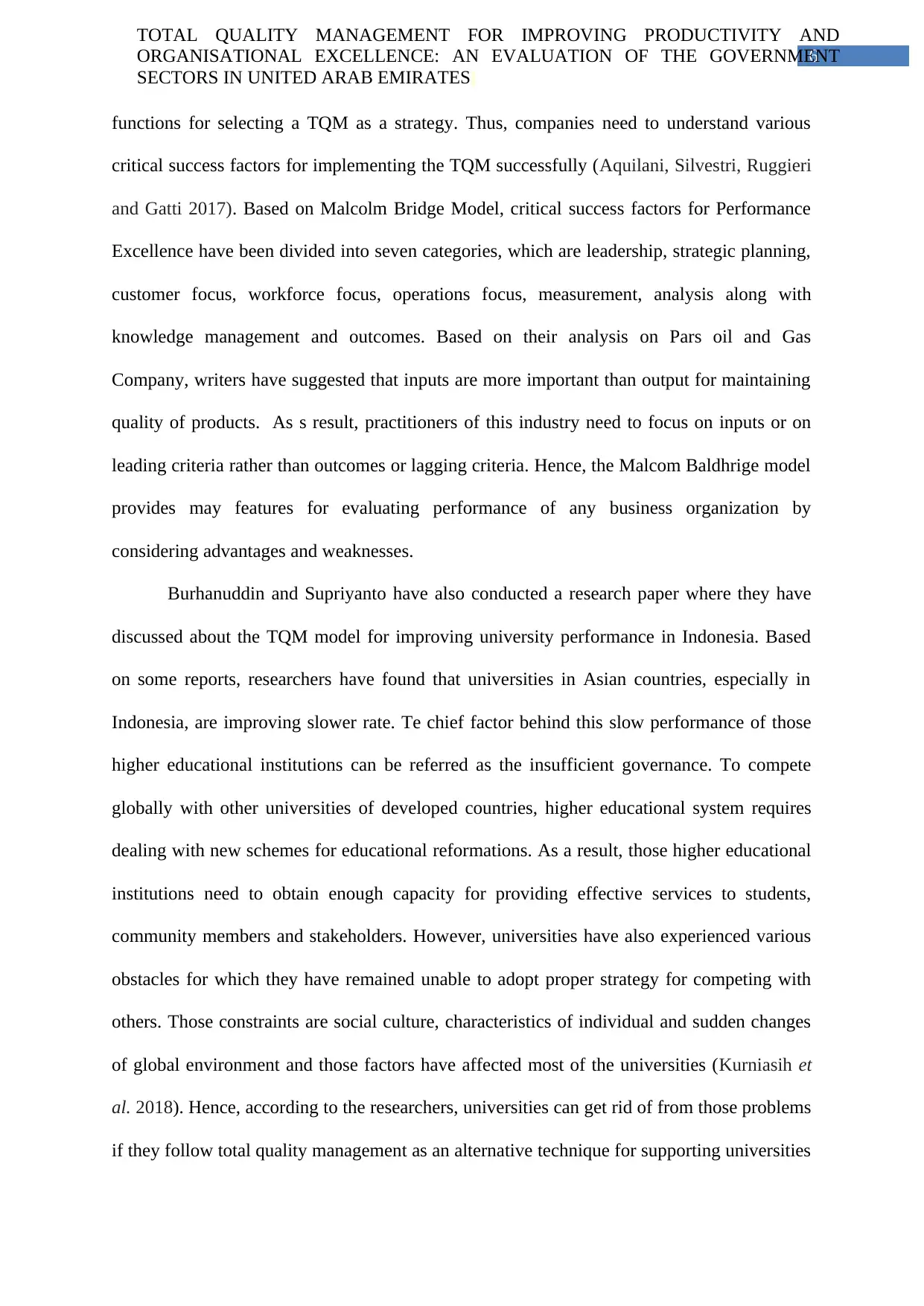
6
TOTAL QUALITY MANAGEMENT FOR IMPROVING PRODUCTIVITY AND
ORGANISATIONAL EXCELLENCE: AN EVALUATION OF THE GOVERNMENT
SECTORS IN UNITED ARAB EMIRATES
functions for selecting a TQM as a strategy. Thus, companies need to understand various
critical success factors for implementing the TQM successfully (Aquilani, Silvestri, Ruggieri
and Gatti 2017). Based on Malcolm Bridge Model, critical success factors for Performance
Excellence have been divided into seven categories, which are leadership, strategic planning,
customer focus, workforce focus, operations focus, measurement, analysis along with
knowledge management and outcomes. Based on their analysis on Pars oil and Gas
Company, writers have suggested that inputs are more important than output for maintaining
quality of products. As s result, practitioners of this industry need to focus on inputs or on
leading criteria rather than outcomes or lagging criteria. Hence, the Malcom Baldhrige model
provides may features for evaluating performance of any business organization by
considering advantages and weaknesses.
Burhanuddin and Supriyanto have also conducted a research paper where they have
discussed about the TQM model for improving university performance in Indonesia. Based
on some reports, researchers have found that universities in Asian countries, especially in
Indonesia, are improving slower rate. Te chief factor behind this slow performance of those
higher educational institutions can be referred as the insufficient governance. To compete
globally with other universities of developed countries, higher educational system requires
dealing with new schemes for educational reformations. As a result, those higher educational
institutions need to obtain enough capacity for providing effective services to students,
community members and stakeholders. However, universities have also experienced various
obstacles for which they have remained unable to adopt proper strategy for competing with
others. Those constraints are social culture, characteristics of individual and sudden changes
of global environment and those factors have affected most of the universities (Kurniasih et
al. 2018). Hence, according to the researchers, universities can get rid of from those problems
if they follow total quality management as an alternative technique for supporting universities
TOTAL QUALITY MANAGEMENT FOR IMPROVING PRODUCTIVITY AND
ORGANISATIONAL EXCELLENCE: AN EVALUATION OF THE GOVERNMENT
SECTORS IN UNITED ARAB EMIRATES
functions for selecting a TQM as a strategy. Thus, companies need to understand various
critical success factors for implementing the TQM successfully (Aquilani, Silvestri, Ruggieri
and Gatti 2017). Based on Malcolm Bridge Model, critical success factors for Performance
Excellence have been divided into seven categories, which are leadership, strategic planning,
customer focus, workforce focus, operations focus, measurement, analysis along with
knowledge management and outcomes. Based on their analysis on Pars oil and Gas
Company, writers have suggested that inputs are more important than output for maintaining
quality of products. As s result, practitioners of this industry need to focus on inputs or on
leading criteria rather than outcomes or lagging criteria. Hence, the Malcom Baldhrige model
provides may features for evaluating performance of any business organization by
considering advantages and weaknesses.
Burhanuddin and Supriyanto have also conducted a research paper where they have
discussed about the TQM model for improving university performance in Indonesia. Based
on some reports, researchers have found that universities in Asian countries, especially in
Indonesia, are improving slower rate. Te chief factor behind this slow performance of those
higher educational institutions can be referred as the insufficient governance. To compete
globally with other universities of developed countries, higher educational system requires
dealing with new schemes for educational reformations. As a result, those higher educational
institutions need to obtain enough capacity for providing effective services to students,
community members and stakeholders. However, universities have also experienced various
obstacles for which they have remained unable to adopt proper strategy for competing with
others. Those constraints are social culture, characteristics of individual and sudden changes
of global environment and those factors have affected most of the universities (Kurniasih et
al. 2018). Hence, according to the researchers, universities can get rid of from those problems
if they follow total quality management as an alternative technique for supporting universities
Paraphrase This Document
Need a fresh take? Get an instant paraphrase of this document with our AI Paraphraser
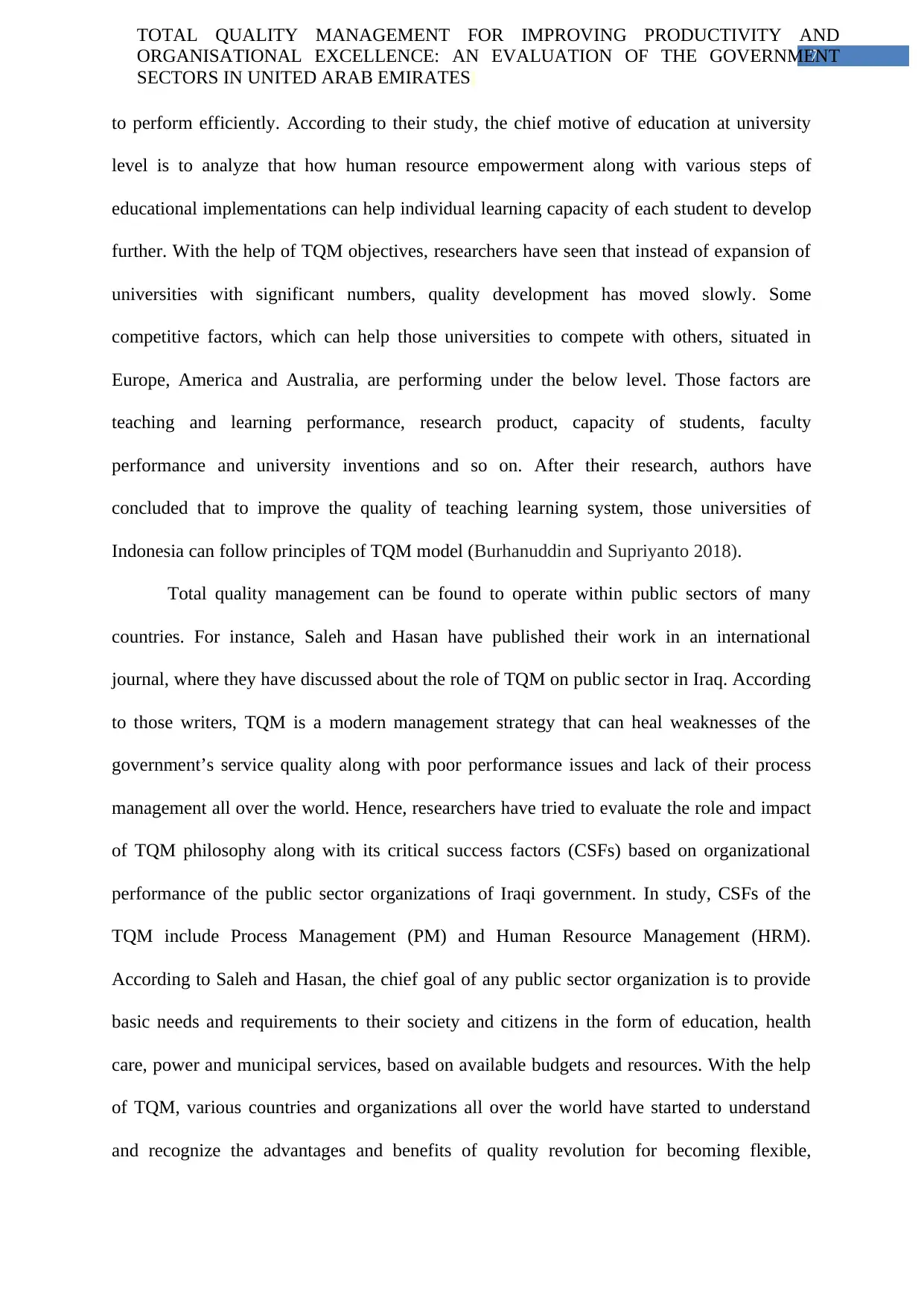
7
TOTAL QUALITY MANAGEMENT FOR IMPROVING PRODUCTIVITY AND
ORGANISATIONAL EXCELLENCE: AN EVALUATION OF THE GOVERNMENT
SECTORS IN UNITED ARAB EMIRATES
to perform efficiently. According to their study, the chief motive of education at university
level is to analyze that how human resource empowerment along with various steps of
educational implementations can help individual learning capacity of each student to develop
further. With the help of TQM objectives, researchers have seen that instead of expansion of
universities with significant numbers, quality development has moved slowly. Some
competitive factors, which can help those universities to compete with others, situated in
Europe, America and Australia, are performing under the below level. Those factors are
teaching and learning performance, research product, capacity of students, faculty
performance and university inventions and so on. After their research, authors have
concluded that to improve the quality of teaching learning system, those universities of
Indonesia can follow principles of TQM model (Burhanuddin and Supriyanto 2018).
Total quality management can be found to operate within public sectors of many
countries. For instance, Saleh and Hasan have published their work in an international
journal, where they have discussed about the role of TQM on public sector in Iraq. According
to those writers, TQM is a modern management strategy that can heal weaknesses of the
government’s service quality along with poor performance issues and lack of their process
management all over the world. Hence, researchers have tried to evaluate the role and impact
of TQM philosophy along with its critical success factors (CSFs) based on organizational
performance of the public sector organizations of Iraqi government. In study, CSFs of the
TQM include Process Management (PM) and Human Resource Management (HRM).
According to Saleh and Hasan, the chief goal of any public sector organization is to provide
basic needs and requirements to their society and citizens in the form of education, health
care, power and municipal services, based on available budgets and resources. With the help
of TQM, various countries and organizations all over the world have started to understand
and recognize the advantages and benefits of quality revolution for becoming flexible,
TOTAL QUALITY MANAGEMENT FOR IMPROVING PRODUCTIVITY AND
ORGANISATIONAL EXCELLENCE: AN EVALUATION OF THE GOVERNMENT
SECTORS IN UNITED ARAB EMIRATES
to perform efficiently. According to their study, the chief motive of education at university
level is to analyze that how human resource empowerment along with various steps of
educational implementations can help individual learning capacity of each student to develop
further. With the help of TQM objectives, researchers have seen that instead of expansion of
universities with significant numbers, quality development has moved slowly. Some
competitive factors, which can help those universities to compete with others, situated in
Europe, America and Australia, are performing under the below level. Those factors are
teaching and learning performance, research product, capacity of students, faculty
performance and university inventions and so on. After their research, authors have
concluded that to improve the quality of teaching learning system, those universities of
Indonesia can follow principles of TQM model (Burhanuddin and Supriyanto 2018).
Total quality management can be found to operate within public sectors of many
countries. For instance, Saleh and Hasan have published their work in an international
journal, where they have discussed about the role of TQM on public sector in Iraq. According
to those writers, TQM is a modern management strategy that can heal weaknesses of the
government’s service quality along with poor performance issues and lack of their process
management all over the world. Hence, researchers have tried to evaluate the role and impact
of TQM philosophy along with its critical success factors (CSFs) based on organizational
performance of the public sector organizations of Iraqi government. In study, CSFs of the
TQM include Process Management (PM) and Human Resource Management (HRM).
According to Saleh and Hasan, the chief goal of any public sector organization is to provide
basic needs and requirements to their society and citizens in the form of education, health
care, power and municipal services, based on available budgets and resources. With the help
of TQM, various countries and organizations all over the world have started to understand
and recognize the advantages and benefits of quality revolution for becoming flexible,
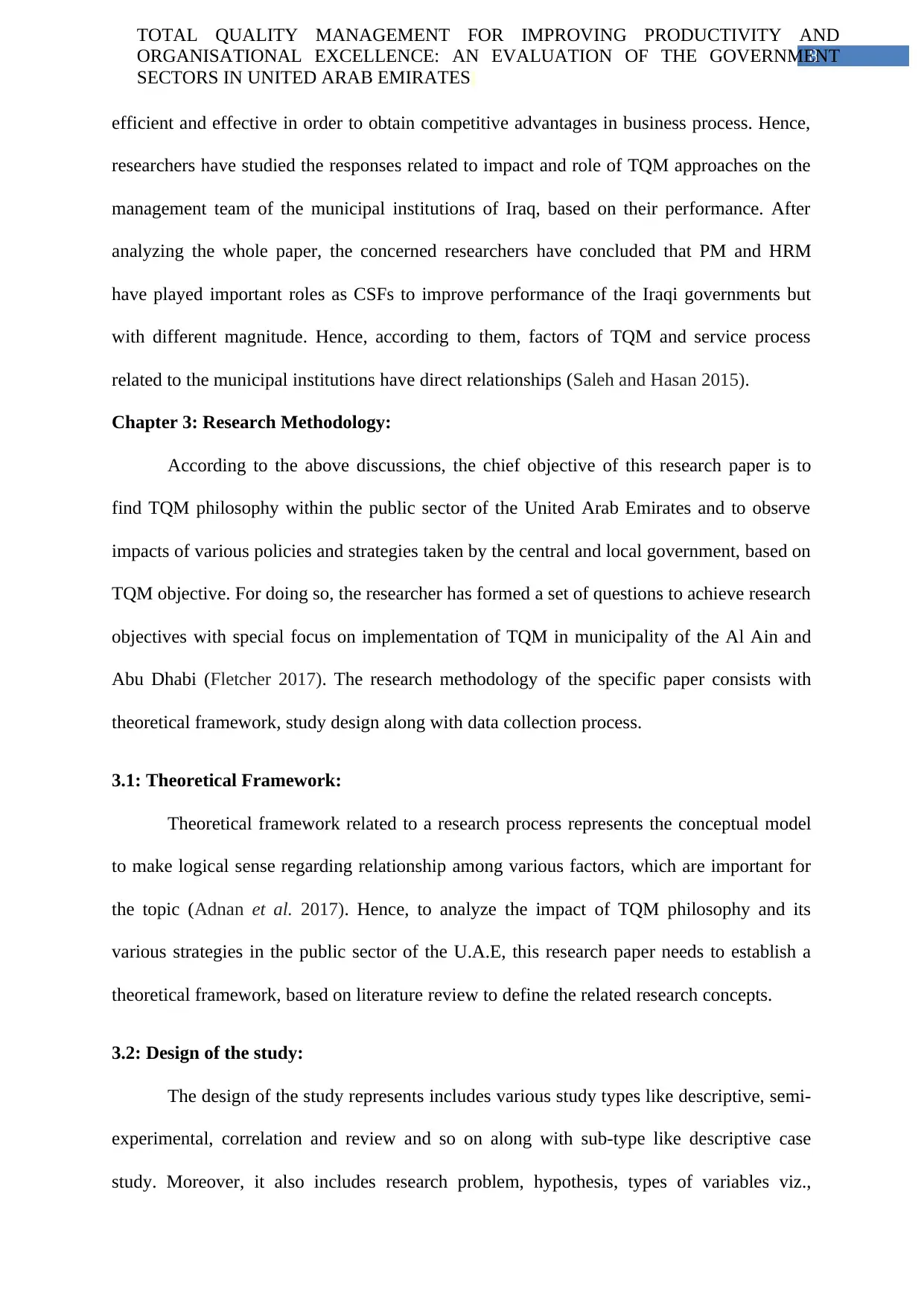
8
TOTAL QUALITY MANAGEMENT FOR IMPROVING PRODUCTIVITY AND
ORGANISATIONAL EXCELLENCE: AN EVALUATION OF THE GOVERNMENT
SECTORS IN UNITED ARAB EMIRATES
efficient and effective in order to obtain competitive advantages in business process. Hence,
researchers have studied the responses related to impact and role of TQM approaches on the
management team of the municipal institutions of Iraq, based on their performance. After
analyzing the whole paper, the concerned researchers have concluded that PM and HRM
have played important roles as CSFs to improve performance of the Iraqi governments but
with different magnitude. Hence, according to them, factors of TQM and service process
related to the municipal institutions have direct relationships (Saleh and Hasan 2015).
Chapter 3: Research Methodology:
According to the above discussions, the chief objective of this research paper is to
find TQM philosophy within the public sector of the United Arab Emirates and to observe
impacts of various policies and strategies taken by the central and local government, based on
TQM objective. For doing so, the researcher has formed a set of questions to achieve research
objectives with special focus on implementation of TQM in municipality of the Al Ain and
Abu Dhabi (Fletcher 2017). The research methodology of the specific paper consists with
theoretical framework, study design along with data collection process.
3.1: Theoretical Framework:
Theoretical framework related to a research process represents the conceptual model
to make logical sense regarding relationship among various factors, which are important for
the topic (Adnan et al. 2017). Hence, to analyze the impact of TQM philosophy and its
various strategies in the public sector of the U.A.E, this research paper needs to establish a
theoretical framework, based on literature review to define the related research concepts.
3.2: Design of the study:
The design of the study represents includes various study types like descriptive, semi-
experimental, correlation and review and so on along with sub-type like descriptive case
study. Moreover, it also includes research problem, hypothesis, types of variables viz.,
TOTAL QUALITY MANAGEMENT FOR IMPROVING PRODUCTIVITY AND
ORGANISATIONAL EXCELLENCE: AN EVALUATION OF THE GOVERNMENT
SECTORS IN UNITED ARAB EMIRATES
efficient and effective in order to obtain competitive advantages in business process. Hence,
researchers have studied the responses related to impact and role of TQM approaches on the
management team of the municipal institutions of Iraq, based on their performance. After
analyzing the whole paper, the concerned researchers have concluded that PM and HRM
have played important roles as CSFs to improve performance of the Iraqi governments but
with different magnitude. Hence, according to them, factors of TQM and service process
related to the municipal institutions have direct relationships (Saleh and Hasan 2015).
Chapter 3: Research Methodology:
According to the above discussions, the chief objective of this research paper is to
find TQM philosophy within the public sector of the United Arab Emirates and to observe
impacts of various policies and strategies taken by the central and local government, based on
TQM objective. For doing so, the researcher has formed a set of questions to achieve research
objectives with special focus on implementation of TQM in municipality of the Al Ain and
Abu Dhabi (Fletcher 2017). The research methodology of the specific paper consists with
theoretical framework, study design along with data collection process.
3.1: Theoretical Framework:
Theoretical framework related to a research process represents the conceptual model
to make logical sense regarding relationship among various factors, which are important for
the topic (Adnan et al. 2017). Hence, to analyze the impact of TQM philosophy and its
various strategies in the public sector of the U.A.E, this research paper needs to establish a
theoretical framework, based on literature review to define the related research concepts.
3.2: Design of the study:
The design of the study represents includes various study types like descriptive, semi-
experimental, correlation and review and so on along with sub-type like descriptive case
study. Moreover, it also includes research problem, hypothesis, types of variables viz.,
⊘ This is a preview!⊘
Do you want full access?
Subscribe today to unlock all pages.

Trusted by 1+ million students worldwide
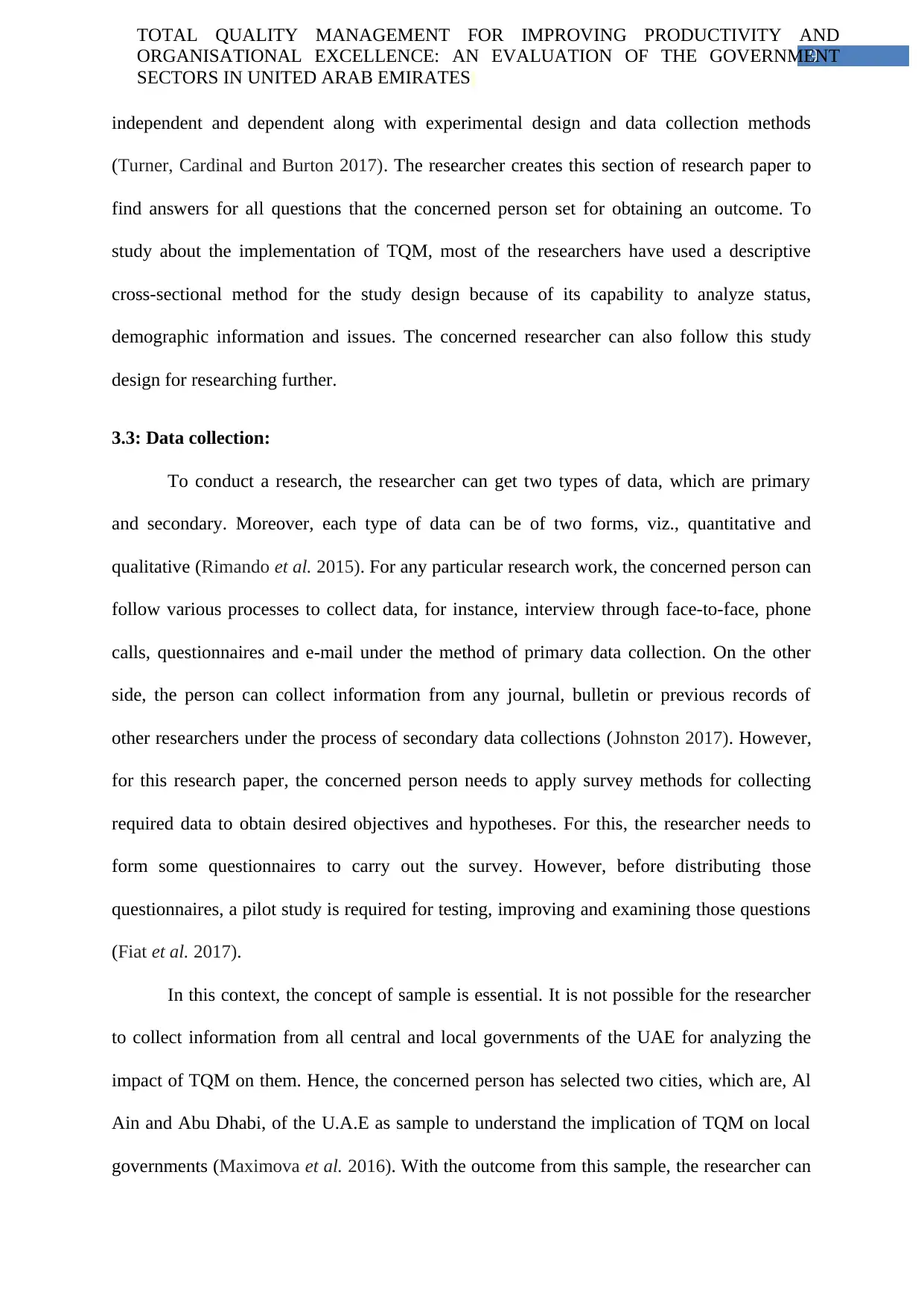
9
TOTAL QUALITY MANAGEMENT FOR IMPROVING PRODUCTIVITY AND
ORGANISATIONAL EXCELLENCE: AN EVALUATION OF THE GOVERNMENT
SECTORS IN UNITED ARAB EMIRATES
independent and dependent along with experimental design and data collection methods
(Turner, Cardinal and Burton 2017). The researcher creates this section of research paper to
find answers for all questions that the concerned person set for obtaining an outcome. To
study about the implementation of TQM, most of the researchers have used a descriptive
cross-sectional method for the study design because of its capability to analyze status,
demographic information and issues. The concerned researcher can also follow this study
design for researching further.
3.3: Data collection:
To conduct a research, the researcher can get two types of data, which are primary
and secondary. Moreover, each type of data can be of two forms, viz., quantitative and
qualitative (Rimando et al. 2015). For any particular research work, the concerned person can
follow various processes to collect data, for instance, interview through face-to-face, phone
calls, questionnaires and e-mail under the method of primary data collection. On the other
side, the person can collect information from any journal, bulletin or previous records of
other researchers under the process of secondary data collections (Johnston 2017). However,
for this research paper, the concerned person needs to apply survey methods for collecting
required data to obtain desired objectives and hypotheses. For this, the researcher needs to
form some questionnaires to carry out the survey. However, before distributing those
questionnaires, a pilot study is required for testing, improving and examining those questions
(Fiat et al. 2017).
In this context, the concept of sample is essential. It is not possible for the researcher
to collect information from all central and local governments of the UAE for analyzing the
impact of TQM on them. Hence, the concerned person has selected two cities, which are, Al
Ain and Abu Dhabi, of the U.A.E as sample to understand the implication of TQM on local
governments (Maximova et al. 2016). With the outcome from this sample, the researcher can
TOTAL QUALITY MANAGEMENT FOR IMPROVING PRODUCTIVITY AND
ORGANISATIONAL EXCELLENCE: AN EVALUATION OF THE GOVERNMENT
SECTORS IN UNITED ARAB EMIRATES
independent and dependent along with experimental design and data collection methods
(Turner, Cardinal and Burton 2017). The researcher creates this section of research paper to
find answers for all questions that the concerned person set for obtaining an outcome. To
study about the implementation of TQM, most of the researchers have used a descriptive
cross-sectional method for the study design because of its capability to analyze status,
demographic information and issues. The concerned researcher can also follow this study
design for researching further.
3.3: Data collection:
To conduct a research, the researcher can get two types of data, which are primary
and secondary. Moreover, each type of data can be of two forms, viz., quantitative and
qualitative (Rimando et al. 2015). For any particular research work, the concerned person can
follow various processes to collect data, for instance, interview through face-to-face, phone
calls, questionnaires and e-mail under the method of primary data collection. On the other
side, the person can collect information from any journal, bulletin or previous records of
other researchers under the process of secondary data collections (Johnston 2017). However,
for this research paper, the concerned person needs to apply survey methods for collecting
required data to obtain desired objectives and hypotheses. For this, the researcher needs to
form some questionnaires to carry out the survey. However, before distributing those
questionnaires, a pilot study is required for testing, improving and examining those questions
(Fiat et al. 2017).
In this context, the concept of sample is essential. It is not possible for the researcher
to collect information from all central and local governments of the UAE for analyzing the
impact of TQM on them. Hence, the concerned person has selected two cities, which are, Al
Ain and Abu Dhabi, of the U.A.E as sample to understand the implication of TQM on local
governments (Maximova et al. 2016). With the outcome from this sample, the researcher can
Paraphrase This Document
Need a fresh take? Get an instant paraphrase of this document with our AI Paraphraser
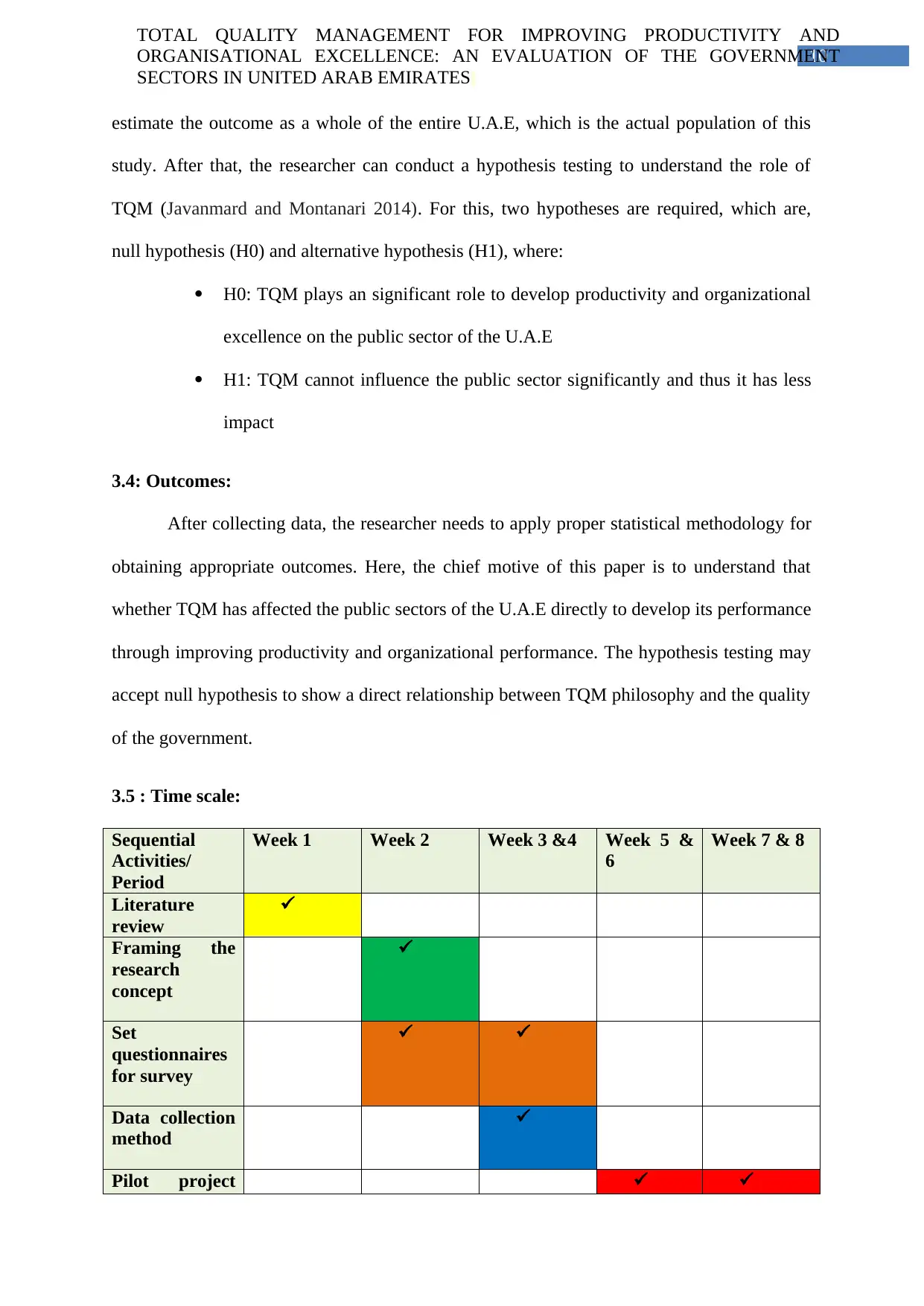
10
TOTAL QUALITY MANAGEMENT FOR IMPROVING PRODUCTIVITY AND
ORGANISATIONAL EXCELLENCE: AN EVALUATION OF THE GOVERNMENT
SECTORS IN UNITED ARAB EMIRATES
estimate the outcome as a whole of the entire U.A.E, which is the actual population of this
study. After that, the researcher can conduct a hypothesis testing to understand the role of
TQM (Javanmard and Montanari 2014). For this, two hypotheses are required, which are,
null hypothesis (H0) and alternative hypothesis (H1), where:
H0: TQM plays an significant role to develop productivity and organizational
excellence on the public sector of the U.A.E
H1: TQM cannot influence the public sector significantly and thus it has less
impact
3.4: Outcomes:
After collecting data, the researcher needs to apply proper statistical methodology for
obtaining appropriate outcomes. Here, the chief motive of this paper is to understand that
whether TQM has affected the public sectors of the U.A.E directly to develop its performance
through improving productivity and organizational performance. The hypothesis testing may
accept null hypothesis to show a direct relationship between TQM philosophy and the quality
of the government.
3.5 : Time scale:
Sequential
Activities/
Period
Week 1 Week 2 Week 3 &4 Week 5 &
6
Week 7 & 8
Literature
review
Framing the
research
concept
Set
questionnaires
for survey
Data collection
method
Pilot project
TOTAL QUALITY MANAGEMENT FOR IMPROVING PRODUCTIVITY AND
ORGANISATIONAL EXCELLENCE: AN EVALUATION OF THE GOVERNMENT
SECTORS IN UNITED ARAB EMIRATES
estimate the outcome as a whole of the entire U.A.E, which is the actual population of this
study. After that, the researcher can conduct a hypothesis testing to understand the role of
TQM (Javanmard and Montanari 2014). For this, two hypotheses are required, which are,
null hypothesis (H0) and alternative hypothesis (H1), where:
H0: TQM plays an significant role to develop productivity and organizational
excellence on the public sector of the U.A.E
H1: TQM cannot influence the public sector significantly and thus it has less
impact
3.4: Outcomes:
After collecting data, the researcher needs to apply proper statistical methodology for
obtaining appropriate outcomes. Here, the chief motive of this paper is to understand that
whether TQM has affected the public sectors of the U.A.E directly to develop its performance
through improving productivity and organizational performance. The hypothesis testing may
accept null hypothesis to show a direct relationship between TQM philosophy and the quality
of the government.
3.5 : Time scale:
Sequential
Activities/
Period
Week 1 Week 2 Week 3 &4 Week 5 &
6
Week 7 & 8
Literature
review
Framing the
research
concept
Set
questionnaires
for survey
Data collection
method
Pilot project
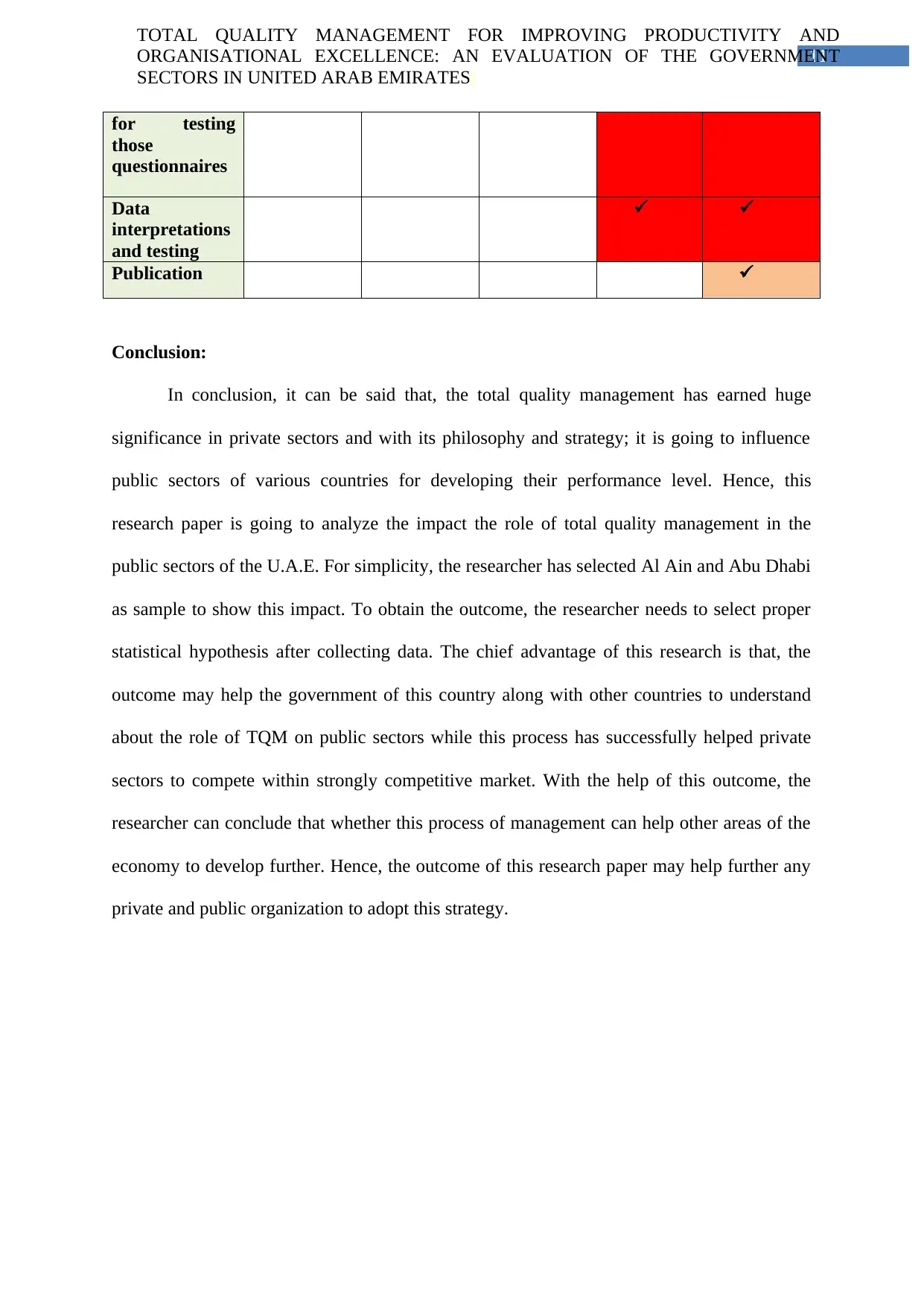
11
TOTAL QUALITY MANAGEMENT FOR IMPROVING PRODUCTIVITY AND
ORGANISATIONAL EXCELLENCE: AN EVALUATION OF THE GOVERNMENT
SECTORS IN UNITED ARAB EMIRATES
for testing
those
questionnaires
Data
interpretations
and testing
Publication
Conclusion:
In conclusion, it can be said that, the total quality management has earned huge
significance in private sectors and with its philosophy and strategy; it is going to influence
public sectors of various countries for developing their performance level. Hence, this
research paper is going to analyze the impact the role of total quality management in the
public sectors of the U.A.E. For simplicity, the researcher has selected Al Ain and Abu Dhabi
as sample to show this impact. To obtain the outcome, the researcher needs to select proper
statistical hypothesis after collecting data. The chief advantage of this research is that, the
outcome may help the government of this country along with other countries to understand
about the role of TQM on public sectors while this process has successfully helped private
sectors to compete within strongly competitive market. With the help of this outcome, the
researcher can conclude that whether this process of management can help other areas of the
economy to develop further. Hence, the outcome of this research paper may help further any
private and public organization to adopt this strategy.
TOTAL QUALITY MANAGEMENT FOR IMPROVING PRODUCTIVITY AND
ORGANISATIONAL EXCELLENCE: AN EVALUATION OF THE GOVERNMENT
SECTORS IN UNITED ARAB EMIRATES
for testing
those
questionnaires
Data
interpretations
and testing
Publication
Conclusion:
In conclusion, it can be said that, the total quality management has earned huge
significance in private sectors and with its philosophy and strategy; it is going to influence
public sectors of various countries for developing their performance level. Hence, this
research paper is going to analyze the impact the role of total quality management in the
public sectors of the U.A.E. For simplicity, the researcher has selected Al Ain and Abu Dhabi
as sample to show this impact. To obtain the outcome, the researcher needs to select proper
statistical hypothesis after collecting data. The chief advantage of this research is that, the
outcome may help the government of this country along with other countries to understand
about the role of TQM on public sectors while this process has successfully helped private
sectors to compete within strongly competitive market. With the help of this outcome, the
researcher can conclude that whether this process of management can help other areas of the
economy to develop further. Hence, the outcome of this research paper may help further any
private and public organization to adopt this strategy.
⊘ This is a preview!⊘
Do you want full access?
Subscribe today to unlock all pages.

Trusted by 1+ million students worldwide
1 out of 15
Related Documents
Your All-in-One AI-Powered Toolkit for Academic Success.
+13062052269
info@desklib.com
Available 24*7 on WhatsApp / Email
![[object Object]](/_next/static/media/star-bottom.7253800d.svg)
Unlock your academic potential
Copyright © 2020–2026 A2Z Services. All Rights Reserved. Developed and managed by ZUCOL.





